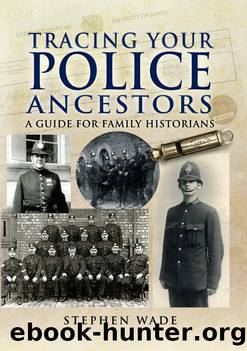Tracing Your Police Ancestors by Stephen Wade

Author:Stephen Wade [Wade Stephen]
Language: eng
Format: epub
ISBN: 9781844158782
Publisher: Pen & Sword Books
Published: 2012-09-15T00:00:00+00:00
LNER detectives at Kings Cross. On the right is DC Herbert (âBertâ) Hinchley. A keen photographer of railways, he rose to be Chief Inspector and worked after retirement as Head of Security at Marylebone. His wife was the first policewoman constable on the LNER Police. (Dr John Bond)
The nature of the force was rationalised during the Second World War and such matters as training and working conditions were attended to; in 1948 the railways across the land were unified and so the police force changed in step with that. In 1962 the British Transport Commission was abolished and the force became simply the British Transport Police. Then in 1992 there was a further reorganisation when the force was split into eight areas, each under the control of an area commander. As historian Kevin Gordon has pointed out, such major developments as the Channel Tunnel have meant that once again the force has had to adapt and change, creating specialised units for the new work that comes along.
There are some records at the force archives, and there is an on-going appeal on the British Transport Police website for donations of all kinds. These archives comprise record cards, photographs, journals, annual reports from chief constables, police manuals, warrant cards and all kinds of personal documents. But the National Archives have most material.
For the earlier period of railway history you will need to search the papers of specific companies, and the first step at the National Archives is to search with the keywords âpoliceâ or ârail.â The department code AN will take the researcher to records dating to after 1921. AN 2 and AN 3 cover the Second World War (when obviously there was far more going on). In addition, there are the minutes of the Chiefs of Police Committee at AN 3/45 covering those war years, and then AN 97, AN 109 and AN 167 for later years.
There are also a number of items such as rule books, regulations and journals relating to the force, and the only way to find out whether these miscellaneous records are useful to you is to look at the summary entries for contents. So, for instance, it would be worth looking at railway police items under MEPO, HO (Home Office) and MT. Examples include the papers of Inspector James Smith of the North Eastern Railway, covering the years 1888â1915, and in Access to Archives the papers of Edward Adams of the NER Docks Police: he was a long-serving constable, his dates being 1896â1957.
Download
This site does not store any files on its server. We only index and link to content provided by other sites. Please contact the content providers to delete copyright contents if any and email us, we'll remove relevant links or contents immediately.
| General | Channel Islands |
| England | Northern Ireland |
| Scotland | Wales |
Room 212 by Kate Stewart(5102)
The Crown by Robert Lacey(4802)
Endurance: Shackleton's Incredible Voyage by Alfred Lansing(4750)
The Iron Duke by The Iron Duke(4345)
The Rape of Nanking by Iris Chang(4197)
Joan of Arc by Mary Gordon(4092)
Killing England by Bill O'Reilly(3989)
Say Nothing by Patrick Radden Keefe(3974)
I'll Give You the Sun by Jandy Nelson(3424)
Shadow of Night by Deborah Harkness(3353)
Hitler's Monsters by Eric Kurlander(3327)
Mary, Queen of Scots, and the Murder of Lord Darnley by Alison Weir(3194)
Blood and Sand by Alex Von Tunzelmann(3191)
Eleanor & Park by Rainbow Rowell(3148)
Darkest Hour by Anthony McCarten(3117)
Margaret Thatcher: The Autobiography by Thatcher Margaret(3072)
Book of Life by Deborah Harkness(2921)
Red Famine: Stalin's War on Ukraine by Anne Applebaum(2917)
The One Memory of Flora Banks by Emily Barr(2853)
